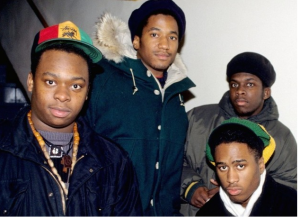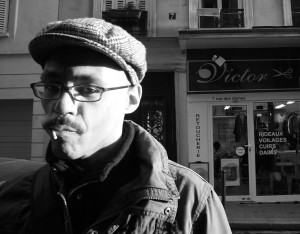FPP spoke with writer and Washington Heights local Victor LaValle about our brains as “virtual reality machines,” walking the streets of New York City to find peace, and his forthcoming novella The Ballad of Black Tom. Victor reads with us this Tuesday, November 10th, 7pm, at Shrine in Harlem.
At the beginning of your most recent work, the novella The Ballad of Black Tom, you write: “People who move to New York always make the same mistake. They can’t see the place.” What does it mean to you to “see” the place you live in?
I mean that a person has to try and understand what they’re expecting, what they’re hoping for, what they fear about any new locale. These personal concerns tend to create the reality we then encounter. All of us are living in a personal virtual reality machine, the brain. Obviously we can’t discard the damn thing (and who would want to?) but it behooves each of us to realize how much we are shaping what we see. This plays into that novella in a vital way. Where one person might see a monster, another will see a human being. And both might be true.
You grew up in Queens, and you’re now living in Washington Heights. In which places in uptown Manhattan and Harlem do you seek refuge, space for contemplation, and renewal? Where do you go to write?
One of the great shocks of my life was when I moved to Oakland and discovered that store owners will almost always let you use their bathrooms. You don’t even have to be a customer! Just walk in and ask if you can use the toilet and they say yes. Growing up in New York this seemed like the height of generosity, true civilization. New York, on the other hand, won’t let you piss unless you buy something first. That’s my experience anyway. So my writing gets done wherever there’s steady access to a toilet. Sad to say that’s my only criteria, but there it is.
As for refuge, space, and renewal I actually don’t feel at all comfortable in the natural world. Or, at least, it’s not all that soothing. I find peace by walking the streets of New York, long walks, a few miles from top to bottom (or at least the middle), weaving through the teeming sidewalks. Amidst all that life, surrounded by it. That, for me, is almost holy.
At FPP we are interested in interrogating the “we,” in asking: how can a plural voice speak, think, or act? “We” seems impossible, like it’s just a second away from disappearing into an “I” or a “they.” We’re curious to learn what the “we” means to you, both in your life in upper Manhattan, and in your writing. How do you conjure, relate to, and write from the “we?”
 This will be a selfish version of the ‘we’ I guess, but I tend to imagine myself at certain discreet ages–3, 11, 15, 21, 27, 33–as constant companions. I mean that these earlier versions of me are traveling alongside me almost all the time. I started doing this when I was 15, there were fewer of us then and now there are more. The coping mechanism of an isolated child really, but I find I can’t let it go. I’m always ‘we’ in that sense. When I was younger we’d even sit down and discuss big decisions among ourselves. We don’t always agree. As life has become better I like to keep them around because those younger versions of me often despaired that life would ever improve. I want them to enjoy my life as much as I do. There’s a comic book character called Madrox the Multiple Man. He can produce many different versions of himself, each is his own being. That’s my version of ‘we,’ if I’m honest.
This will be a selfish version of the ‘we’ I guess, but I tend to imagine myself at certain discreet ages–3, 11, 15, 21, 27, 33–as constant companions. I mean that these earlier versions of me are traveling alongside me almost all the time. I started doing this when I was 15, there were fewer of us then and now there are more. The coping mechanism of an isolated child really, but I find I can’t let it go. I’m always ‘we’ in that sense. When I was younger we’d even sit down and discuss big decisions among ourselves. We don’t always agree. As life has become better I like to keep them around because those younger versions of me often despaired that life would ever improve. I want them to enjoy my life as much as I do. There’s a comic book character called Madrox the Multiple Man. He can produce many different versions of himself, each is his own being. That’s my version of ‘we,’ if I’m honest.
Your work straddles the literary and the occult and mystical, venturing into territory that is non-sane, maudlin and difficult. What compels or propels you into this territory?
It’s so much fun! These days I write stories with big drama, lots of reversals and surprises, and monsters, too. I can’t tell you how much joy this brings me. I want to interrogate serious subjects without becoming self-serious.
‘Literary’ has become synonymous with ‘realism’ but that’s giving realism way too much credit. A piece of writing is literary because it interrogates a situation with nuance and depth. That’s it. There’s plenty of realism that fails to do any more than capture details. This is no more valuable than a piece of horror fiction that seeks only to share the gory details of a murder. Neither seeks to illuminate, they only illustrate. While my work does touch on the mystical and the monstrous they’re in the story to deepen its meaning.
Can you give us a sense of what you’ll read for us on Nov 10th?

